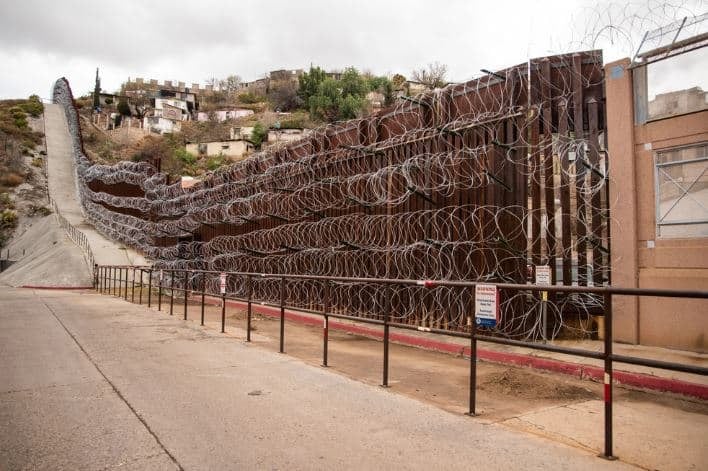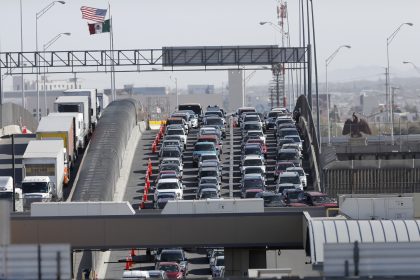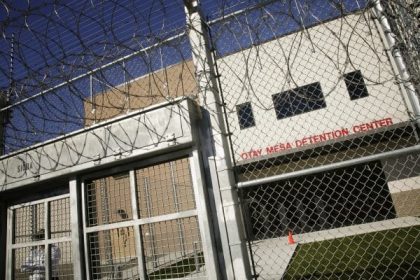White House Says President Will Veto GOP Border Plan

WASHINGTON — If the House GOP’s Secure the Border Act — a bill that, among other things, would restart construction of former President Donald Trump’s border wall between the U.S. and Mexico — somehow makes it through the Senate, President Joe Biden will veto it, the White House Office of Management and Budget said Monday.
As previously reported by The Well News, introduced May 2, H.R. 2, the Secure the Border Act of 2023, runs 213-pages and includes scores of measures the Republicans say are needed to close a border left wide open by the Biden administration and left to allegedly “fall into the hands of violent cartels.”
“The crisis at our Southern border is among the gravest threats to U.S. national security in our history,” said Rep. Mario Diaz-Balart, R-Fla., who co-sponsored the bill with Rep. Tom McClintock, R-Calif., in a written statement.
“For the last two years, President Biden and his administration have entirely neglected the escalating crisis at our border, and their lack of action has ceded all control to narco-terrorist cartels, who are now among the most powerful in deciding who comes into our country and at what price,” Diaz-Balart said.
A summary of the bill from the office of House Speaker Kevin McCarthy, R-Calif., said the act will secure the border and combat illegal immigration by deploying technology to the southern and northern borders; increase the number of border patrol agents and provide them with bonus pay; strengthen current laws aimed at protecting unaccompanied children from human trafficking and strengthen and streamline the asylum process, among other measures.
But it is the border wall, Trump’s signature promise during the 2016 presidential campaign, that leads the bill.
The Secure the Border Act would require the secretary of Homeland Security to resume “all activities related to the construction of the border wall between the United States and Mexico” within seven days of its enactment.
To carry this out, the act directs the secretary to “expend all unexpired funds appropriated or explicitly obligated for the construction of the border wall … beginning on Oct. 1, 2019.”
It also directs that “any unused materials purchased … for the construction of the border wall” during the Trump years “may be used for activities related to the [renewed] construction of the border wall.”
In addition, the act requires the secretary of Homeland Security to submit an implementation plan including annual benchmarks for the construction of 200 miles of the border wall as well as cost estimates associated with the work.
It also suggests that if the project were to move forward, “future funds” may be appropriated “or otherwise made available” by Congress.
In its response to the bill Monday morning, the White House Office of Management and Budget said the administration “strongly supports productive efforts to reform the nation’s immigration system,” but goes on to say the Secure the Border Act simply doesn’t make the grade.
“A successful border management strategy must include robust enforcement at the border of illegal crossings, deterrence to discourage illegal immigration, and legal pathways to ensure that those in need of protection are not turned away to face death or serious harm,” the OMB said.
In the view of the White House, the GOP bill would simply make some elements of the current immigration system worse.
In contrast, the White House said, its strategy is grounded in a strategy that would expand legal pathways to immigration while increasing the consequences for illegally entering the country.
This, the OMD said, will help maintain “safe, orderly and humane” processing of immigrants showing up at the U.S. border.
“However, the administration is limited in what it can achieve by an outdated statutory framework and inadequate resources, particularly in this time of unprecedented global movement,” the OMD said.
Further, it said, “H.R. 2 does nothing to address the root causes of migration, reduces humanitarian protections, and restricts lawful pathways, which are critical alternatives to unlawful entry.
“The bill would cut off nearly all access to humanitarian protections in ways that are inconsistent with our nation’s values and international obligations,” the White House said. “In addition, the bill would make processing less efficient by prohibiting the use of the CBP One mobile application to process noncitizens and restricting DHS’s parole authority, such that successful programs, like Uniting for Ukraine, would be prohibited.
“The bill would also reduce authorized funding for essential programs including the Shelter and Services Program that provides a critical source of funds for state and local governments and reduces pressure at the border,” it continued.
“While we welcome Congress’ engagement on meaningful steps to address immigration and the challenges at the border, this bill would make things worse, not better. Because this bill does very little to actually increase border security while doing a great deal to trample on the nation’s core values and international obligations, it should be rejected,” the OMD said.
Dan can be reached at [email protected] and at https://twitter.com/DanMcCue






















